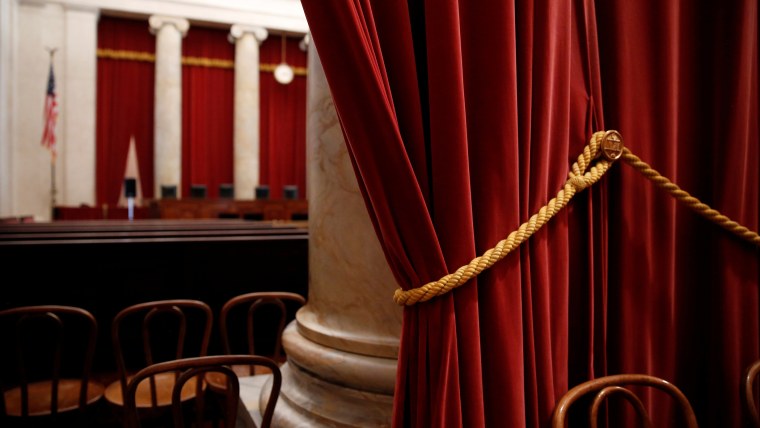Around this point two years ago, the U.S. Supreme Court had an opportunity to do major harm to public-sector unions, but didn't. After Justice Antonin Scalia's death, and Senate Republicans' refusal to confirm a compromise nominee from Barack Obama, the high court had eight members, who were split 4-4 on the issue of "agency fees."
Donald Trump's appointee, Justice Neil Gorsuch, is now on the bench, where he'll break the tie on the case that returned to the Supreme Court yesterday. In a piece for NBC News yesterday, Loyola Law School professor Jessica Levinson, the president of the Los Angeles Ethics Commission, set the stage:
At issue in the case are the laws in 22 states which allow public unions to require that public employees who are not union members to pay so-called "agency" or "fair share" fees. The idea is that even public employees who are not members benefit from the collective bargaining of that union, and therefore should pay for the union's representation. Without the ability of unions to charge these agency fees, unions would be spending a great deal of time and money negotiating contracts that benefit both members of unions and non-union members. This creates the problem of non-union "free-riders" -- workers who benefit from the union's collective bargaining efforts but don't pay for them.The Supreme Court blessed this arrangement in a 1977 case called Abood v. Detroit Board of Education, in which the court found that public employees could be forced to pay for expenses associated with collective bargaining and other related activities, but not for political activities.
The question is whether the court is prepared to overturn that 41-year-old precedent. After yesterday's oral arguments, legal observers seem to have a strong hunch where this one is headed. Slate's Mark Joseph Stern explained:
Everything about Janus reeks of illegitimacy. The legal claim is laughable, the outcome preordained; even the ostensible plaintiff, Mark Janus, is a puppet. At a recent event, Janus revealed that he does not understand the case at all and in fact supports collective bargaining but incorrectly thinks his union fees are supporting political campaigns. His lawyers seem to have lied to him -- much like the court will soon lie to us in proclaiming that the First Amendment somehow prohibits the agency fees at issue in this case.Don't believe it. The conservative justices can dress up their gibberish in whatever legalese they wish. The reality will remain that Janus is a partisan vehicle designed to serve partisan goals, carried across the finish line by five justices who might as well admit that the Constitution has nothing to do with it.
Indeed, the court's five-member conservative majority effectively did admit it. Anthony Kennedy reportedly "launched into a rant of sorts, arguing the unions consistently push for 'massive government,' as well as higher taxes and additional borrowing," delivering rhetoric "more commonly heard on Fox News than in a courtroom of any kind."
Gorsuch didn't tip his hand during yesterday's proceedings, but his vote is not in doubt.
And what happens if/when AFSCME loses this case in another 5-4 ruling? Millions of public-sector workers will be able to opt-out of their agency fees, which in turn would further weaken unions, which in turn would undermine workers' ability to negotiate for better benefits.
It will also, naturally, undermine labor's political potency -- which has long been the point of conservative efforts to overturn the 1977 ruling.
